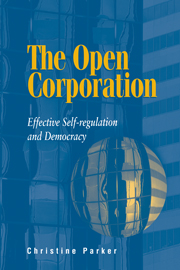Book contents
- Frontmatter
- Contents
- List of tables and figures
- Preface
- Acknowledgements
- 1 Introduction: Corporate self-regulation in the new regulatory State
- 2 The potential for self-regulation
- 3 Motivating top-management commitment to self-regulation
- 4 Cultivating self-regulation leadership
- 5 Self-regulation methodology and social harmony
- 6 The pathologies of self-regulation
- 7 Model corporate Citizens: The role of self-regulation Professionals
- 8 The three strategies of ‘permeability’ in the open Corporation
- 9 Meta-regulation: The regulation of self-regulation
- 10 Conclusion
- Appendix: Methodology
- Notes
- Reference
- Index
2 - The potential for self-regulation
Published online by Cambridge University Press: 05 July 2014
- Frontmatter
- Contents
- List of tables and figures
- Preface
- Acknowledgements
- 1 Introduction: Corporate self-regulation in the new regulatory State
- 2 The potential for self-regulation
- 3 Motivating top-management commitment to self-regulation
- 4 Cultivating self-regulation leadership
- 5 Self-regulation methodology and social harmony
- 6 The pathologies of self-regulation
- 7 Model corporate Citizens: The role of self-regulation Professionals
- 8 The three strategies of ‘permeability’ in the open Corporation
- 9 Meta-regulation: The regulation of self-regulation
- 10 Conclusion
- Appendix: Methodology
- Notes
- Reference
- Index
Summary
What are the factors that make corporate responsiveness to democratic social control inherently difficult? The first part of this chapter reviews the organizational factors that business ethics researchers have shown often fragment and destroy possibilities for organizational integrity. This is the problem of disconnection between corporate life and individual integrity and external values. In the remainder of this chapter I set out a normative ideal of how corporations should be democratically responsive; and a hypothesis as to how this might be institutionalized in fact. Democracy would, ideally, require corporate permeability to external values – the ‘open corporation’. In order to accomplish this in fact, corporate management must move through each of three phases of response to social and legal responsibility issues:
1 the commitment to respond;
2 the acquisition of specialized skills and knowledge; and
3 the institutionalization of purpose.
Each of these phases represents a decision point at which external influences can transform corporate practice and decision-making. But continuing interaction with external stakeholders and regulators at the next decision point must help to ensure that the management response is appropriate (see Figure 2.3). As I will show, the existence of internal constituencies (Sigler and Murphy 1988: 103–4) with the responsibility for implementing self-regulation Systems or ensuring the Company addresses integrity issues is a linchpin for ensuring appropriate managerial responses at each decision point.
Difficulties of institutionalizing responsibility
The methods of the new regulatory State require us to look inside corporations in order to evaluate their potential for institutionalizing responsibility.
- Type
- Chapter
- Information
- The Open CorporationEffective Self-regulation and Democracy, pp. 31 - 61Publisher: Cambridge University PressPrint publication year: 2002



